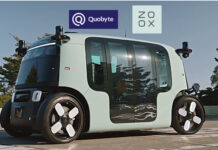Hitachi Vantara has announced the general availability of its first Hitachi iQ AI infrastructure offering, enabling its customers to use Hitachi Vantara storage with Nvidia’s BasePOD GPU server system.
The Hitachi iQ AI systems portfolio concept was revealed in March. Four months later, the first deliverables center around Nvidia BasePOD certification, meaning Hitachi Vantara storage hardware and software can be used in mid-range AI workloads. High-end ones need Nvidia’s bigger and more powerful SuperPOD, which is not yet supported by Hitachi iQ. The DGX BasePOD was launched in 2022, including up to nine Nvidia DGX A100 servers with 8 x A100 GPUs, 12 storage servers (from Nvidia partners), and three networking switches. The larger DGX SuperPOD is composed of between 20 and 140 DGX A100 systems.
Octavian Tanase, Hitachi Vantara’s chief product officer, stated: “Nvidia DGX BasePOD certification not only tells you that this solution has met rigorous standards for reliability and performance, but it also represents a significant upgrade to handle the extensive bandwidth and speed required by today’s networks.”

Tony Paikeday, senior director of DGX systems at Nvidia, said: “The combination of solutions built on Nvidia’s DGX platform and software, coupled with Hitachi Vantara’s expertise in AI discovery and planning, will help provide customers with a foundation to turbocharge their generative AI capabilities.”
In Tanase’s view: “Hitachi iQ is equipped to handle the most demanding AI workloads, helping our customers enjoy seamless, high-speed AI operations that keep them ahead of the curve.”
Hitachi Vantara is also launching an AI Discovery Service to help customers identify the most valuable AI use cases, assess their data readiness, determine ROI, and create a strategic roadmap for AI implementation. Customers can select from a range of AI consultative services from a three-week Discovery program to an Advisory and Jumpstart program lasting up to 12 weeks, featuring a technology assessment, proof-of-concept scoping, production planning, and more.
The three-week Discovery offering has three phases:
- Opportunity Analysis (Week 1): Immersion in company priorities, inventory of internal data sources, risk identification and opportunity prioritization
- Use Case Selection (Week 2): Identify priority use cases to optimize the business and pinpoint a candidate for initial pilot based on value creation opportunity, risk and data availability
- Planning (Week 3): Plan a proof-of-concept vision, approach and timeline, aligned to value creation goals, hypotheses to validate and success criteria, then Hitachi Vantara recommends a high-level roadmap for next actions
Jeb Horton, SVP of Global Services at Hitachi Vantara, stated: “AI solutions require a combination of tools, technologies, platforms, and frameworks that facilitate model development, deployment, and management. By combining the industry expertise of Hitachi and Hitachi group company partners such as GlobalLogic with the Hitachi iQ solutions portfolio, the company offers a unique blend of infrastructure and services capabilities to provide the market with customized, industry-specific tools.”

We asked Hitachi Vantara CTO for Artificial Intelligence & X-Portfolio Jason Hardy some questions about Hitachi iQ.
Blocks & Files: Will Hitachi Vantara get certified with Nvidia’s SuperPod?
Jason Hardy: We are celebrating the success of our BasePOD certification, while simultaneously planning for what’s next. There are obvious goals including the development of additional Hitachi iQ solutions, and we are also in the process of planning what is next for our Nvidia partnership. While we can’t speak for Nvidia in terms of their plans for SuperPOD, examples like SuperPOD, additional compute capabilities, and planning for the next generation of GPUs are obvious points of discussion.
Blocks & Files: Will Hitachi Vantara support GPU Direct?
Jason Hardy: Yes, Hitachi Content Software for File has supported GPUDirect capabilities since 2021. The inclusion of the Nvidia Ethernet and InfiniBand switching portfolio as a part of our Hitachi iQ release means that we are now able to provide our customers with an end-to-end solution. Because GPUDirect requires specific integration beyond just “plugging it in,” Hitachi iQ engineering teams are actively working on an integration guide to help our customers simplify deployment and integration into their environments and workflows, which we expect to make available as an added resource in the coming months.
Blocks & Files: Does Hitachi Vantara support LLM dataset storage, including vector embeddings?
Jason Hardy: Yes, Hitachi Vantara’s broad range of storage capabilities have created the perfect portfolio to support the requirements of a GenAI workload. Whether you are utilizing the Hitachi Content Platform or VSP One File as a repository for raw data targeted for RAG/Vector processing, or the Hitachi Content Software for File platform for high-speed vector database storage to support the high-performance query and embeddings workload that RAG pipelines generate, Hitachi Vantara’s storage capabilities are especially well suited to support various AI workloads.
Blocks & Files: Does Hitachi Vantara support RAG workflows?
Jason Hardy: Yes, Hitachi Vantara’s portfolio supports both the computational workload required for RAG and the storage requirements that both source data acquisition from either NAS, Object, or Block, and the high-speed requirements for the GPU workload required to perform the embeddings and queries.
Additionally, Hitachi’s capabilities to support our customers in implementing their GenAI pipelines, including the necessary RAG processing, allows for us to be a unique position for both the infrastructure requirements and the engineering requirements to build these solutions.
Blocks & Files: Does Hitachi Vantara do anything to aid structured information be use used in RAG workflows or AI generally?
Jason Hardy: Today, using Hitachi Content Intelligence and our Pentaho software suite, we can help our customers understand their data ecosystem, including the detection and transformation.
***
Hitachi iQ and the AI Discovery Service are now both available globally. Get more information from a Hitachi V webpage, Horton blog, and solution brief document.








